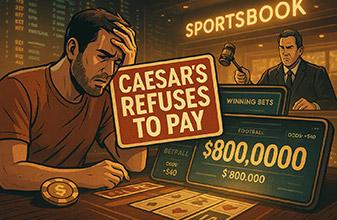Bettor wins $800K in sports bets but casinos refuse to pay

A man from Chicago won $800,000 from sports wagers he placed, traveling as far as Iowa to do it. The casinos refused to pay in when it came time.
Twenty-four-year-old Thomas McPeek lives with his parents. In order to place some informed sports bets, McPeek studied a number of books. He made a ton of bets last year, including parlays, which are intricate football wagers in which a number of things must happen for the bettor to win.
In August 2024, he made his first visit to the Horseshoe Casino's sportsbook in Hammond, Indiana. Over the span of about a week, he entered with roughly $30,000 and won $350,000.
In September, McPeek went on to the Isle Casino in Bettendorf, Iowa. Caesars owns both the Isle and the Horseshoe. Mc Peek spent many hours at the betting kiosk, entering a large number of wagers totaling almost $20,000.
McPeek searches for bets where he thinks he has a good chance of winning. He does in-depth research and manually tabulates the results in a notepad. Professional gamblers like McPeek may eventually gain an advantage. However, any short-term success is by no means assured.
The majority of McPeek's tickets were unsuccessful. However, some of them were winners -- in fact, big winners. However, the Horseshoe is now refusing to give him the $350,000 he won. According to McPeek, Caesars claimed it somehow has the right to “void” the tickets when he attempted to collect his money in October. He was referred to the “house rules” without further explanation.
When McPeek went back to the Iowa casino to pick up about $450,000 for his winning tickets, the situation was similar. A printed sheet outlining structuring or anti-money laundering regulations and repeat wagering laws was presented to him there.
Like most advantage players, McPeek makes a concerted effort to be anonymous and out of the spotlight. To prevent his bets from being noticed and the factors creating his advantage then being removed from the offering, he makes numerous small wagers at a kiosk rather than a large one with a clerk at the counter.
“Trying to remain invisible” is a common advantage-play practice and has nothing to do with money laundering. Obviously the casinos know this, and conveniently use anti-money laundering regulations as an excuse to refuse payment to patrons who are able to win by using their knowledge of the games and odds. McPeek makes every effort to keep his identity private.
McPeek was banned and his bets were declared worthless by Horseshoe in Hammond. This contrasted with Michigan City, Indiana's Blue Chip Casino. According to McPeek, Blue Chip gave him a check for $127,000. He continued by saying that they were honest about being beaten fairly and that he was properly paid after winning the bets, but asked to never return to the property, which is within its rights.
McPeek complained to the state gambling authorities in Iowa and Indiana. Neither state took his side.
In this tale of sports betting, who was correct? Mike Lawton, a former Nevada gaming regulator, stated,. "There's probably some details and some circumstances that we're not privy to.”
After working in casinos in Las Vegas, Scott Morrow retired and is currently a gaming instructor at the University of Nevada, Las Vegas.
"He went around, tried to circumvent the system — circumvent the house rules — and actually drove across state lines to circumvent it," Morrow said of McPeek. "So I mean, I have a tough time finding sympathy for his case."
Though he says he has never encountered a situation like this before, Eli Feustel, the author of the book—in fact, several books—on betting, supports McPeek. Based on when Caesars canceled the wagers, Feustel sides with McPeek.
"If Caesars had decided before the first game was played to void all the wagers, that would be fair. That would be saying, 'You've broken the rules,'" Feustel said, "and when they saw that they didn't win — when they waited to see if they'd win before they voided him — that's where their problem is. The clear answer is Caesars owes this."
"There's no rules against staying under the radar," McPeek responded. "It's horrible what they're doing to me."
The Indiana Gaming Commission stated that Caesars complied with its regulations by nullifying the bets. Iowa regulators say they are currently reviewing McPeek's complaint. According to Caesars, McPeek's betting action was an attempt to get around its regulations, therefore they canceled the bets. Caesars says that McPeek can get his money back on the wagers he made, including his losing bets. McPeek considers that a ridiculous offer.
A judge may have to make the final decision. McPeek stated that he will file a lawsuit if he is not paid.
Source:
“Illinois man wins $800K in sports bets but Iowa, Indiana casinos won't pay” , kcci.com, April 25, 2025.











Please log in or register to leave a comment